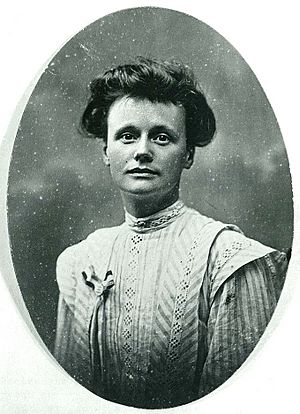Annot Robinson facts for kids
Annot Robinson, also known as Annie, was a brave Scottish woman. She was born Annot Erskine Wilkie on June 8, 1874. She was a suffragette, meaning she fought for women to have the right to vote. She was also a pacifist, which means she believed in peace and was against war.
Annot was even sent to prison for six months. This happened because she tried to get into the House of Commons to make her voice heard. She also helped start a very important group called the Women's International League for Peace and Freedom. This group worked for peace around the world.
Early Life and Learning
Annot Erskine Wilkie was born in Montrose, Scotland. Her father, John Wilkie, was a draper (someone who sells cloth). Her mother, Catherine Jane Erskine, was a teacher. Annot had two sisters. One of her sisters, Helen Wilkie, also worked for women's rights. Helen was a great speaker. She helped organize women for a big march in Edinburgh in 1907.
Annot started her education as a pupil teacher at Montrose Academy. This meant she learned to teach while also helping in the classroom. Later, she went to teacher training college. She also took many classes at the University of St Andrews. She studied English, French, Astronomy, and History. In 1901, she earned her LLA degree from the university.
Fighting for Women's Rights
Annot worked as a teacher in Dundee. There, she met Agnes Husband, who was part of the Labour Party. Agnes inspired Annot to get involved in politics.
In 1906, Annot became the first secretary of the Women's Social and Political Union (WSPU) in Dundee. This group used strong actions to get women the right to vote. In 1907, she moved to Manchester. She became an organizer for the WSPU there. She also joined the Independent Labour Party.
In 1908, Annot and other WSPU members tried to enter the House of Commons. They wanted to protest for women's voting rights. For this action, she was sent to prison for six months.
Later, Annot became an organizer for the Women's Labour League. She spoke out when the main Labour Party did not fully support women's voting rights. She then worked for the National Union of Women's Suffrage Societies. This group used more peaceful ways to achieve votes for women.
During World War I, Annot left that group. She helped create the Women's International League for Peace and Freedom. She also organized "Women's Peace Crusades" across the country. She fought for equal pay for women who worked in munitions factories. These factories made weapons and supplies for the war.
After the war, Annot continued to work for the Women's International League for Peace and Freedom. She traveled to America, Britain, and Holland. She worked as an organizer until 1922.
Death
Annot Robinson passed away on September 29, 1925. She died in Perth Royal Infirmary during an operation. Ellen Wilkinson, a famous politician, wrote about Annot after her death. She said Annot was a "big woman and a big personality." She also said Annot had a "sharp tongue" and a great sense of humor.
Posthumous Recognition
Annot Robinson's name and picture are honored in London. They are on the base of the statue of Millicent Fawcett in Parliament Square. This statue was revealed in 2018. Her name is there with 58 other women who supported women's right to vote.
 | Roy Wilkins |
 | John Lewis |
 | Linda Carol Brown |


